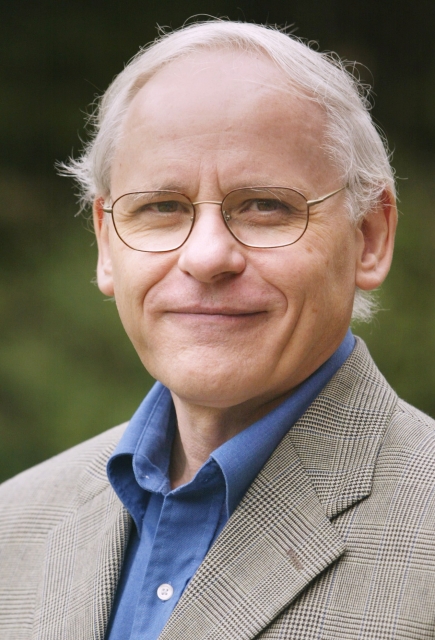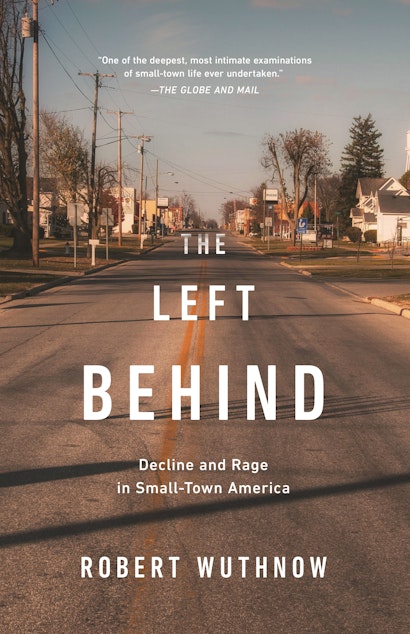What is fueling rural America’s outrage toward the federal government? Why did rural Americans vote overwhelmingly for Donald Trump? And, beyond economic and demographic decline, is there a more nuanced explanation for the growing rural-urban divide? Drawing on more than a decade of research and hundreds of interviews, Robert Wuthnow brings us into America’s small towns, farms, and rural communities to paint a rich portrait of the moral order—the interactions, loyalties, obligations, and identities—underpinning this critical segment of the nation. Wuthnow demonstrates that to truly understand rural Americans’ anger, their culture must be explored more fully. Moving beyond simplistic depictions of the residents of America’s heartland, The Left Behind offers a clearer picture of how this important population will influence the nation’s political future.
You argue that rural America’s politics cannot be understood in terms of economic problems, but require a cultural explanation. What do you mean by that?
RW: What I learned from the research over the past decade in which my research assistants and I interviewed hundreds of rural Americans is that their identity is deeply connected with their communities. We cannot understand rural Americans by thinking of them only as individuals. They have to be understood in terms of their communities. I call these moral communities because people feel obligated to them and take their cues about what is right and good from their neighbors. These moral communities define their way of life. But these ways of life are slipping away. Population is declining, schools are closing, jobs are disappearing, and young people are moving away. Even families who are doing well economically feel the changes. They are having to commute farther for work and to conduct business. The major forces shaping society are beyond their control. People feel threatened and misunderstood.
Are you suggesting that Donald Trump appealed to this sense of displacement? Did rural voters win him the election?
RW: Many factors went into the 2016 presidential election. Political analysts are still sorting them out. Rural voters did opt for Trump is greater percentages than urban voters. My research was less concerned with the election, though, than with understanding at a deeper level what people in small towns and on farms value and why they feel threatened. You have to spend time in rural communities and talk at length with people to understand this. You can go out as a reporter and ask them about politics. But ordinarily they don’t talk that much about politics. They live from day to day going to work, taking their kids to school, maybe volunteering for a local church or club, and maybe helping their neighbors. They see problems, but basically like their communities and want them to stay strong. If you just see rural Americans as voters, you miss the warp and woof of their daily lives.
When they did talk about politics, the people you studied seemed to be totally alienated from Washington. What troubles them about the federal government?
RW: They voiced two major complaints about Washington: the federal government is distant and at the same time it is intrusive. Washington’s distance is both geographic (in most cases) and cultural. It is perceived as catering to urban interests. Washington bureaucrats don’t seem to care about rural America or even inquire about its needs. They seem to look down on people in small towns. Washington nevertheless intrudes on daily life through taxes, regulations, and unfunded mandates. Besides that, Washington deviates from small town residents’ notions of common sense. It strikes them that big bureaucracy is inevitably inefficient and ineffective.
From what you’ve learned about rural Americans, would you think they now have buyer’s remorse and will vote Democratic next time?
RW: Some may. Current trade policies have hurt farm families. Rural hospitals and small-town schools are struggling. Nothing is being done to promote jobs in rural areas or to address the opioid epidemic. Rural people are certainly aware that President Trump is very different from them in terms of origin, wealth, and values. But many rural Americans have been Republicans all their lives and are unlikely to change their affiliations. In those locations, voting preferences happen in Republican primaries. Anger at Washington, as we know, can be directed at “establishment” Republicans as well as at Democrats.
You paint a largely sympathetic portrait of rural America, but you also say you heard things you disagreed with. Can you say something about that?
RW: The most disturbing comments were ones with blatant racist overtones. These were not common but surfaced in reference to President Obama especially in the South. Comments about immigrants were more mixed than Trump’s anti-immigrant rhetoric might suggest. Farmers and construction companies often relied on immigrant labor. Sometimes small towns were happy to have newcomers and had done well adapting schools and service programs to immigrant families. Negative sentiment mostly focused on undocumented immigrants and Muslims.
How are rural churches faring these days?
RW: Church-going still occurs at higher rates in rural communities than in cities. Depopulation has forced some congregations to merge or close. Clergy sometimes minister to congregations in several locations, much like circuit riders did in the nineteenth century. Membership may be declining and aging, but churches still provide vital community services, including assistance to the poor.
There are approximately 14,000 small towns in the United States and the rural population is estimated at somewhere between 30 and 50 million people. Surely you observed a great deal of variety.
RW: Absolutely. The biggest differences are between towns of fewer than 5,000 people and towns with 10,000 to 25,000 people. While most of the smaller towns are declining, most of the larger ones are holding their own or growing. It also helps growth to be a county seat and located near an interstate highway. Towns with better climate and natural amenities are doing well too. Agriculture is the mainstay of small town America, but the most common jobs are often in social services. I was surprised at how many towns have small manufacturing plants. Many of these towns of course are struggling to prevent plant closings.
You grew up in a small town in Kansas. How did that experience affect your research? Did you find that things nowadays are dramatically different?
RW: My hometown, like many small towns, is smaller than it was by about 50 percent. It is also more ethnically diverse. Farms are larger. People commute to other towns to work. Townspeople have had to work hard to keep the hospital open and build a new middle school. The ambience is a mixture of cautious optimism and concern. I found that it other places too. People are proud of their community. It’s home. But they worry. When a school closes or a large family moves away, it affects everyone. As one resident put it, “It tears at your gut.”
Robert Wuthnow is the Gerhard R. Andlinger ‘52 Professor of Social Sciences at Princeton University. His many books include American Misfits and the Making of Middle-Class Respectability, Small-Town America, and Remaking the Heartland.

